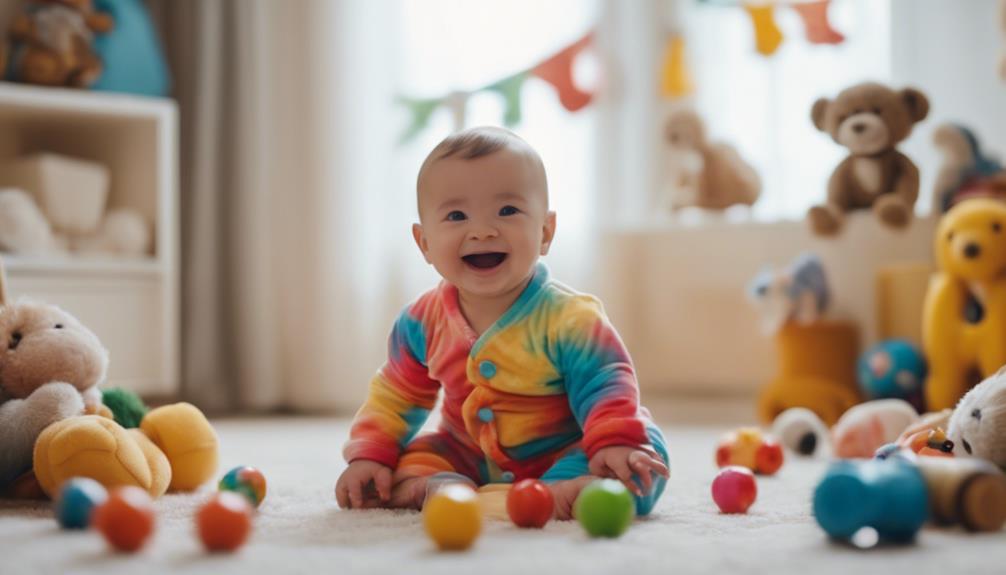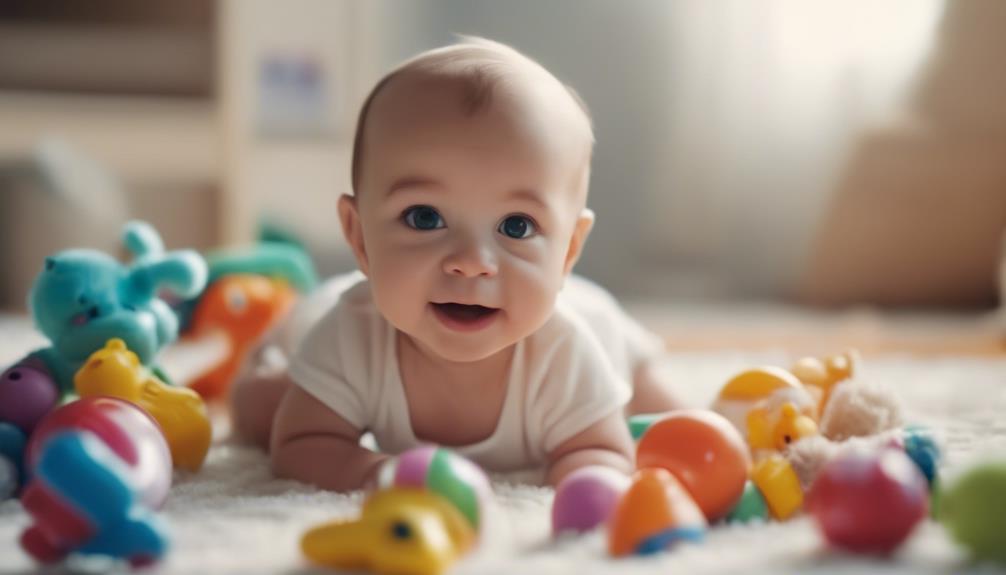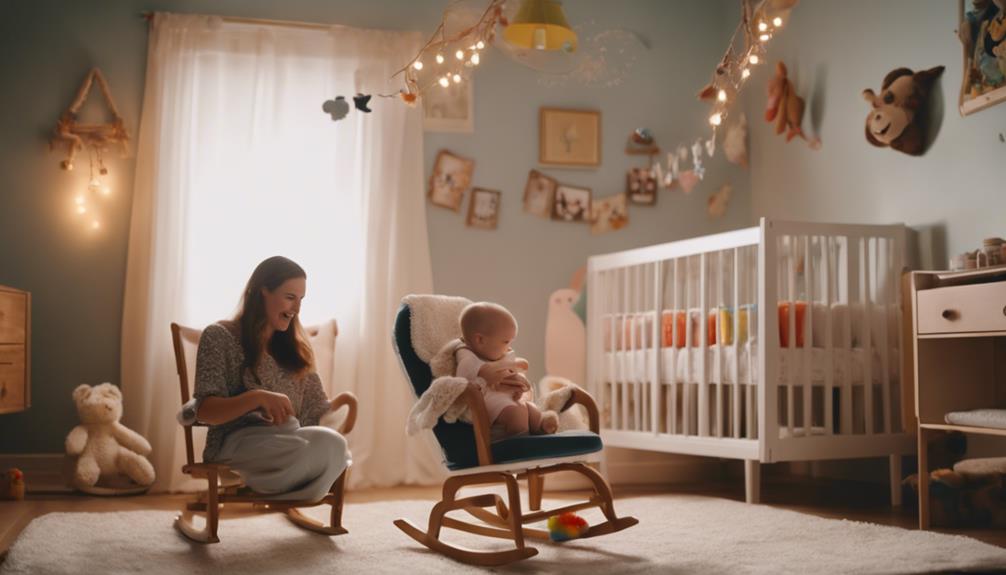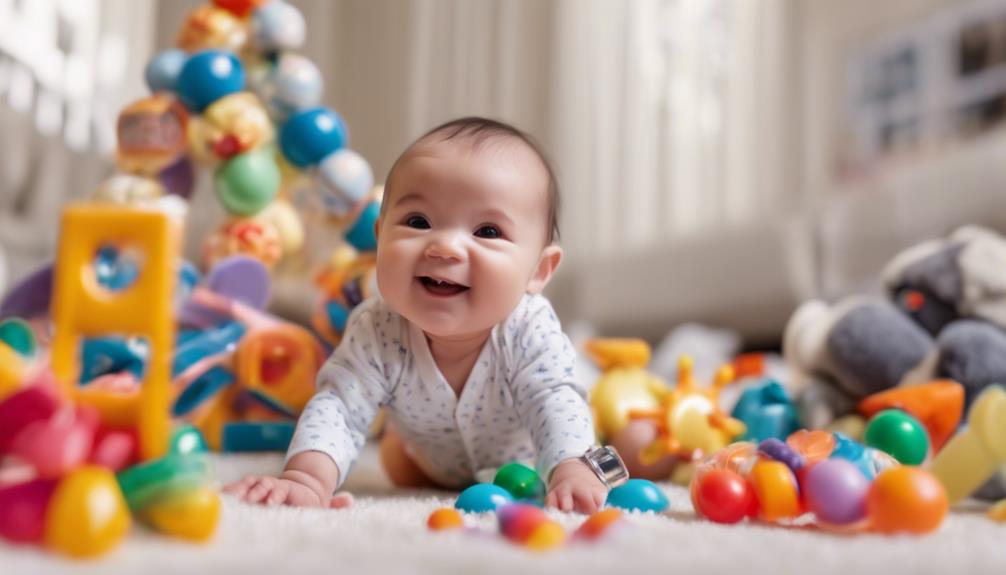Your baby’s constant happiness and smiles are a result of important social and emotional development milestones. From reflexive smiles as newborns to smiling with everyone at 6 months, each stage indicates progress in social, emotional, and cognitive growth. Face-to-face interactions, maintaining eye contact, and engaging in positive activities are crucial in encouraging these joyful expressions. By facilitating positive interactions and providing nurturing experiences, you contribute to shaping your baby’s cheerful demeanor. Delve deeper to enhance your knowledge of your baby’s smile development and uncover more ways to promote their happiness.
Key Takeaways
- Smiling signifies positive social and emotional development in infants.
- Social interactions, cognitive growth, and age influence baby's smiling behavior.
- Strong social skills, emotional connections, and well-being are linked to frequent baby smiles.
- Babies smile in response to interactions, emotional expression, and positive reinforcement.
- Nurturing, positive interactions, and emotional connections encourage baby smiles.
Early Stages of Smile Development
During the early stages of smile development, infants typically start smiling around 6-8 weeks in response to social stimuli or interactions. These baby smiles may not always reflect an inner emotional state but serve as an important form of communication between your little one and the world around them.
As your baby continues to grow and develop, these smiles become more intentional, reflecting improved visual, emotional, and social capabilities.
Factors such as age, social interactions, and cognitive growth play significant roles in the progression of baby smiles. Each smile your baby shares is a milestone in their communication journey, evolving from reflexive to purposeful expressions of joy, comfort, or even a call for attention.
Encouraging and responding to these smiles can further enhance your bond with your infant, fostering a sense of security and belonging as they navigate their early stages of development.
Reflexive Smiles in Newborns

As newborns, your baby's first smiles are reflexive responses that occur during drowsiness, REM sleep, or when passing gas. These initial smiles are purely physical reflexes and last only a few seconds. They aren't yet intentional and are more of a spontaneous reaction.
These reflexive smiles are the earliest form of smiling in infants and don't involve social cues. It's important to note that these first smiles are fleeting and not driven by social interaction. You may find that these reflexive smiles come and go quickly, sometimes catching you by surprise.
While they may not hold the same meaning as later social smiles, these initial expressions are a fascinating glimpse into your baby's early development. Cherish these early moments of your baby's reflexive smiles, as they mark the beginning of their journey towards more intentional and meaningful expressions of joy.
Social Smiles at 2-3 Months
Around 2-3 months, your baby will start flashing those heart-melting social smiles. These purposeful grins show recognition of loved ones and mark the beginning of emotional connections.
Engaging with eye contact, these smiles are the building blocks of early social interactions.
Early Social Interactions
At 2-3 months, babies typically begin to display social smiles, responding intentionally to familiar faces with engaging expressions. These smiles are more than just a reflex; they are a way for your baby to communicate recognition and connection with loved ones. During this stage, babies start to differentiate between people, showing selective smiles towards family and friends. Eye contact becomes crucial for engagement as babies focus on facial expressions and responses in social interactions. This early social interaction is vital for your baby's development, marking the beginning of their social communication skills and emotional connections.
| Early Social Interactions | Babies at 2-3 Months |
|---|---|
| Behavior | Display social smiles to familiar faces |
| Recognition | Engaging expressions, symmetrical smiles |
| Differentiation | Selective smiles towards family and friends |
| Engagement | Eye contact for focusing on facial expressions |
Baby's Joyful Responses
During their second to third month of life, babies typically exhibit joyful responses through social smiles, engaging their entire face in recognition of familiar individuals. These smiles, emerging as intentional responses to stimuli, are symmetrical, lasting longer, and convey pleasure through purposeful expressions. Special individuals hold significance for babies during this stage, eliciting these purposeful smiles that mark a developmental milestone in establishing connections with others.
Eye contact plays an essential role in evoking these social smiles and fostering engagement. As babies become more adept at recognizing faces and forming bonds, their joyful responses become more pronounced and frequent.
The symmetrical nature of these smiles, engaging the entire face, reflects the genuine pleasure and recognition babies experience when interacting with those they hold dear. Social smiles at 2-3 months signify the beginning of a baby's ability to express their emotions and form emotional connections with caregivers and loved ones.
Developing Emotional Connections
Babies at the 2-3 month mark demonstrate their developing emotional connections through purposeful social smiles that engage their entire face, reflecting recognition of special individuals. These smiles aren't just random expressions but rather intentional responses that show a baby's ability to communicate joy and pleasure.
At this stage, babies start to differentiate between familiar faces and strangers, displaying selective smiles that indicate their growing awareness of social interactions. The social smiles babies exhibit typically involve eye contact, lasting longer as a sign of engagement and connection with others.
Smiling With Everyone at 6 Months

Exhibiting a broad sense of happiness and comfort, your 6-month-old baby is likely to be smiling with everyone, showing their social engagement abilities. At this age, babies tend to smile a lot, expressing joy and contentment through their interactions with various individuals. Here are some key points to ponder regarding your baby's indiscriminate smiling behavior:
- Indiscriminate Smiling: Babies at 6 months enjoy interactions with both familiar and unfamiliar faces, showcasing their positive social development.
- Positive Social Development: Social smiling at this stage reflects your baby's ability to form emotional connections and engage positively with others.
- Emotional Connections: Smiling with everyone signifies a healthy and interactive behavior in babies, fostering a sense of comfort and security.
- Interactive Behavior: Your baby's smiles with everyone demonstrate their willingness to engage socially and explore the world around them.
- Healthy Development: Overall, smiling with everyone at 6 months is a positive sign of your baby's social and emotional well-being, indicating a growing sense of happiness and comfort in various social settings.
Selective Smiles at 9 Months
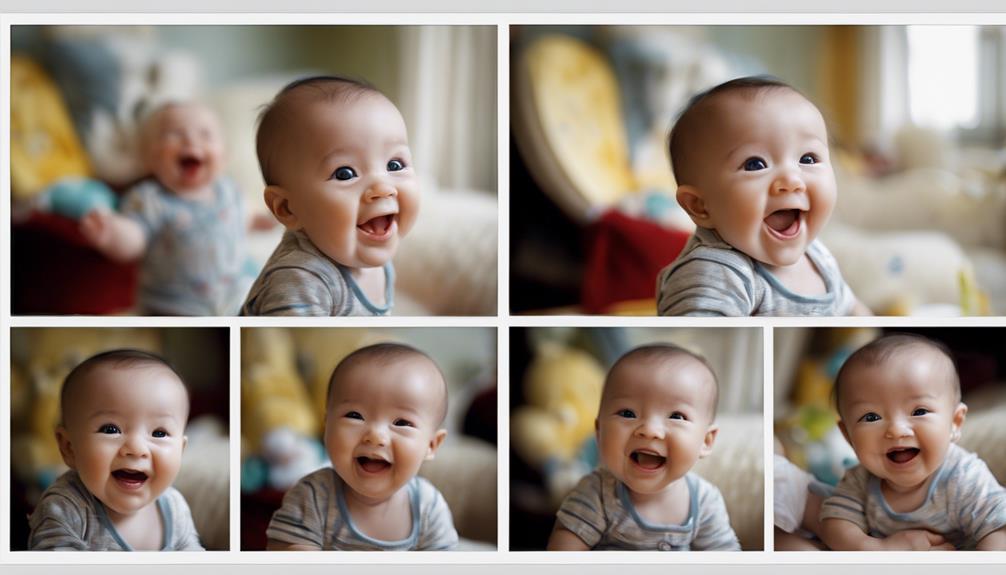
As your baby reaches 9 months, you may notice a shift towards selective smiles, indicating a newfound awareness of familiar faces and potential unease towards strangers.
At this stage, your little one is starting to distinguish between friends, family, and unfamiliar individuals. Selective smiles show a healthy social development as your baby becomes more discerning in interactions.
It's common for babies to smile in response to loved ones they recognize while displaying signs of discomfort like crying or unease when faced with strangers. This behavior reflects a natural progression in social awareness and emotional growth.
Understanding your baby's selective smiles can help you provide the necessary support and reassurance during this developmental phase. By acknowledging and respecting your baby's preferences in who they feel comfortable smiling at, you can foster a sense of security and help them navigate social interactions with confidence.
Smiles Reflecting Personality at 12 Months
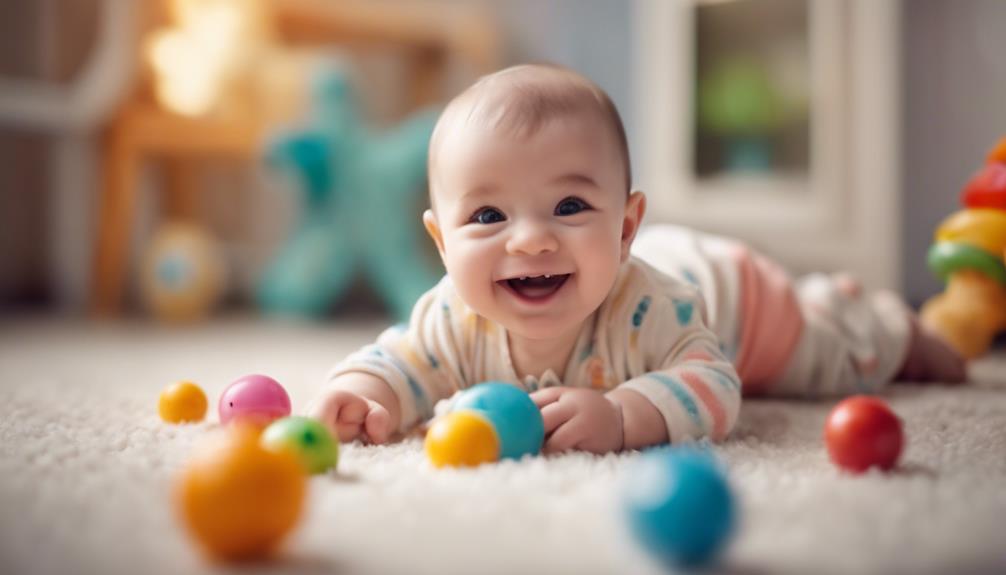
By 12 months, your baby's smiles start to mirror their developing sense of humor and unique personality traits. At this stage, your little one's smiles become more intentional, reflecting a deeper emotional range and reactions.
Here are some key points to ponder about smiles reflecting personality at 12 months:
- Babies at 12 months often find humor in various situations, leading to frequent smiles and laughter.
- These smiles can convey a wide range of emotions, from joy and excitement to surprise or even shyness.
- Your baby's smiles at this age become an essential part of their emerging personality traits, offering insights into their character.
- Paying attention to and enjoying these smiles can help you understand your baby's evolving preferences and reactions.
- As your baby's sense of humor develops, their smiles will continue to be a delightful reflection of their growing personality.
Understanding Baby's Smile Development
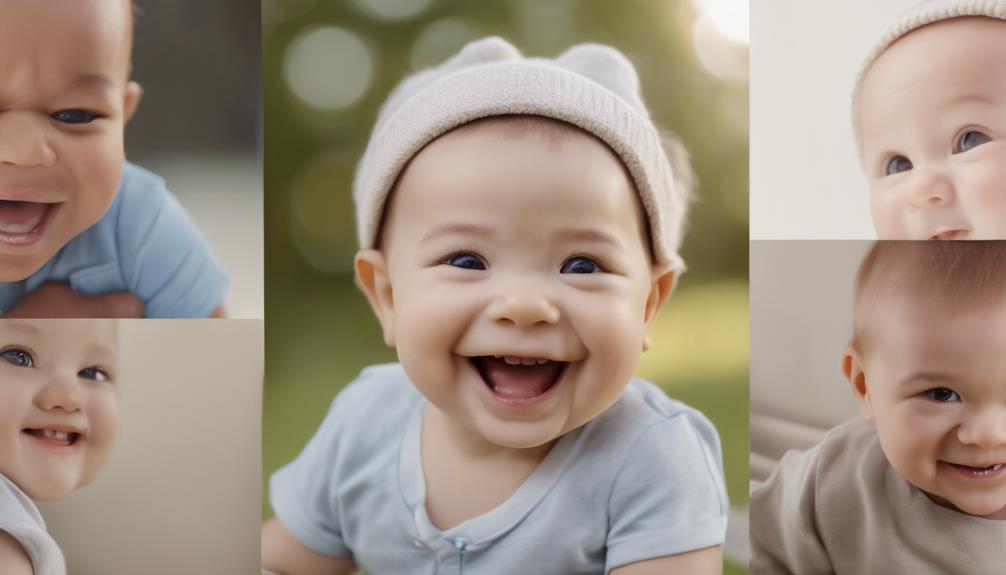
By understanding your baby's smile development, you can track early milestones that signify social and emotional growth.
Smiling is a vital learning process for infants, highlighting their progress in various developmental areas.
Factors like age, social interactions, and cognitive growth play key roles in your baby's ability to express emotions through smiles.
Early Smiling Milestones
Understanding the development of your baby's smile involves recognizing the progression from reflexive to social smiles within the first few months of life. Baby smiles typically start as reflexive, occurring from birth to around 6 weeks, and then evolve into social smiles by 2-3 months. Here are some essential milestones in your baby's early smiling journey:
- Reflexive smiles are instinctual and not in response to external stimuli.
- Social smiles emerge in response to interactions, usually directed towards familiar faces.
- Early smiles indicate progress in social, emotional, and visual growth.
- Factors like age, social interactions, and cognitive development influence smile milestones.
- Smiling serves as a way for babies to bond, express emotions, and receive positive reinforcement.
It's normal if your baby doesn't make direct eye contact while smiling at first, as they're absorbing cues from their environment to learn and grow.
Social Interaction Importance
Your baby's essential happiness and smiling are clear indicators of their strong social interaction skills and positive emotional connections.
Smiling plays a vital role in your baby's early development, showcasing their ability to engage with the environment and the people around them.
When your baby smiles frequently, it demonstrates that they're interacting well with others and forming healthy relationships.
These strong social skills and emotional connections are fundamental for your baby's overall well-being and happiness.
Constant happiness and smiling suggest that your baby is on track for a healthy and thriving social development journey.
Encourage and cherish these moments of joy and smiling, as they aren't only heartwarming but also significant markers of your baby's positive social interaction abilities.
Emotional Expression Significance
The importance of emotional expression in babies can be observed through their developmental smiles, which reflect key improvements in social, emotional, and visual skills.
When it comes to understanding your baby's smile development, there are significant factors to take into account:
- Baby smiles indicate enhanced face recognition and awareness of connecting with others.
- Smiling reflects cognitive growth and emotional well-being in infants.
- Age plays a vital role in the development of different types of smiles.
- Social interactions with caregivers and mimicking behavior influence smile development.
- Emotional connections with loved ones contribute to the use of smiles for communication.
Understanding the stages of smiling in babies, from reflexive smiles to intentional smiles used for bonding and communication, can provide valuable insights into your little one's emotional and social development.
Tips for Encouraging Baby Smiles

Foster baby smiles by engaging in frequent face-to-face interactions and responding to your little one's cues. Talking to your baby, maintaining eye contact, and flashing a smile throughout the day can encourage your baby to respond in kind.
Create a nurturing environment by using facial expressions and engaging in activities that promote positive emotions without overwhelming your baby.
To further encourage smiles, provide vocal and visual stimulation to elicit social smiles. These interactions help your baby connect with others and express their emotions.
Remember to be mindful of overstimulation and offer breaks for emotional regulation to guarantee a healthy balance.
Addressing Concerns About Baby's Smiles
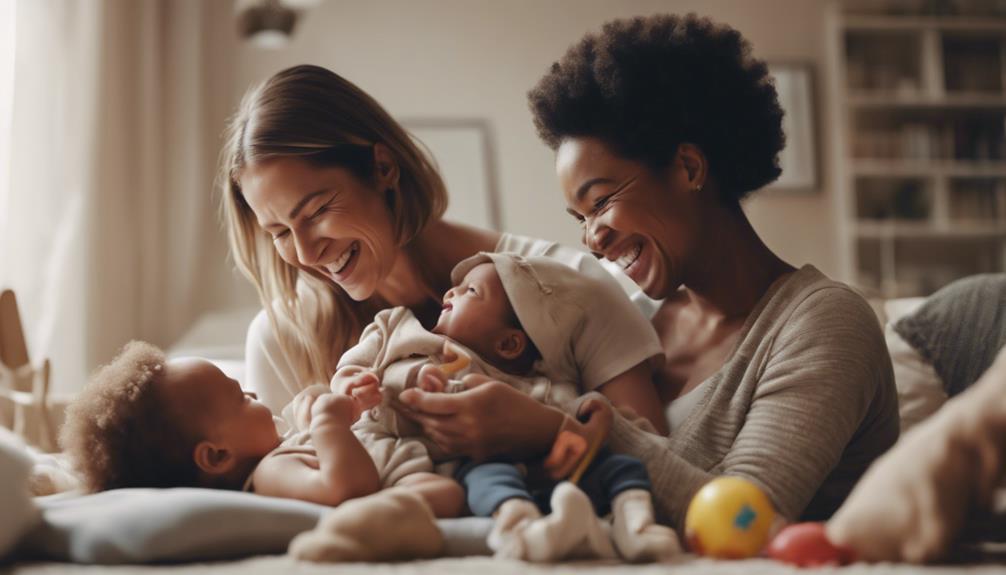
When considering potential concerns about your baby's constant smiling, it's important to understand the normalcy of this behavior in their social development.
Here are some important points to keep in mind:
- Constant smiling in babies is usually nothing to worry about and is a normal part of their social development.
- Rare cases of constant smiling may be linked to Angelman Syndrome, a rare genetic disorder, but it's not common.
- Parents of very smiley babies typically have no concerns and enjoy their baby's happiness.
- Smiling is a learning process for babies, helping them understand social interactions and emotions.
- It's important to appreciate and encourage your baby's smiles as they're a natural part of their growth and communication.
Frequently Asked Questions
Why Is My Baby so Smiley All the Time?
Your baby smiles often because they're learning to engage and communicate with you. It's a natural way for babies to connect and express joy. Enjoy these moments, as smiles are a beautiful part of your bonding experience.
What Does a Smiley Happy Baby Mean?
When your baby is always beaming with joy, it's a heartwarming sign of their emotional well-being and social connections. Their constant smiles are tiny reflections of their happiness and contentment, bringing light to your world.
Why Is My Baby Smiling Without Reason?
Your baby smiles without reason because it's a natural part of their development. Smiling helps them express joy, connect with you, and navigate their world. Celebrate these moments as they enhance your bond and foster their social skills.
Do Babies Smile Because They're Happy?
Babies smile for various reasons, not just happiness. Their smiles serve as social cues, seeking interaction and connection. Recognizing the nuances in baby smiles helps caregivers understand their child's emotional and social development accurately.
Conclusion
To sum up, understanding the stages of baby smile development can help you appreciate the joy and growth in your little one. By encouraging smiles and providing a loving environment, you can help nurture their happiness and personality.
So, next time your baby flashes a big smile, remember all the milestones they've reached and enjoy the moment! After all, who can resist a baby's contagious smile?



